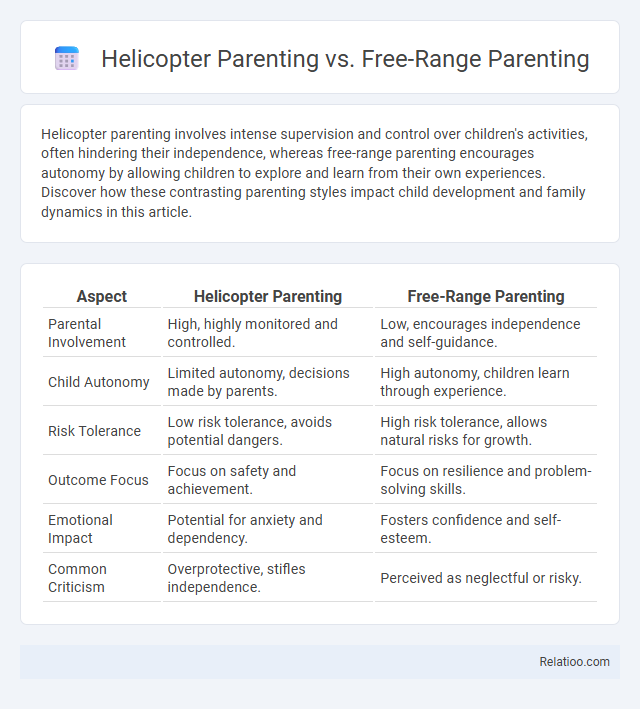Helicopter parenting involves intense supervision and control over children's activities, often hindering their independence, whereas free-range parenting encourages autonomy by allowing children to explore and learn from their own experiences. Discover how these contrasting parenting styles impact child development and family dynamics in this article.
Table of Comparison
| Aspect | Helicopter Parenting | Free-Range Parenting |
|---|---|---|
| Parental Involvement | High, highly monitored and controlled. | Low, encourages independence and self-guidance. |
| Child Autonomy | Limited autonomy, decisions made by parents. | High autonomy, children learn through experience. |
| Risk Tolerance | Low risk tolerance, avoids potential dangers. | High risk tolerance, allows natural risks for growth. |
| Outcome Focus | Focus on safety and achievement. | Focus on resilience and problem-solving skills. |
| Emotional Impact | Potential for anxiety and dependency. | Fosters confidence and self-esteem. |
| Common Criticism | Overprotective, stifles independence. | Perceived as neglectful or risky. |
Understanding Helicopter Parenting: Definition and Characteristics
Helicopter parenting is characterized by an intense focus on monitoring and managing every aspect of Your child's life, often leading to over-involvement and limited independence. This parenting style includes behaviors such as constant supervision, solving problems for children, and protecting them from failure, which can impact emotional development and self-reliance. Understanding these traits is crucial to distinguishing helicopter parenting from free-range parenting, which emphasizes autonomy and experiential learning.
What is Free-Range Parenting? Key Principles Explained
Free-Range Parenting emphasizes fostering independence and self-reliance in children by allowing them age-appropriate freedom to explore their environment with minimal supervision. Key principles include encouraging decision-making, promoting risk-taking within safe boundaries, and trusting your child's ability to manage everyday challenges. This approach contrasts with Helicopter Parenting, where constant oversight limits autonomy, ultimately nurturing confident and resourceful individuals.
The Origins and Evolution of Parenting Styles
Parenting styles originated from early psychological theories, with Diana Baumrind's research in the 1960s identifying authoritative, authoritarian, and permissive styles. Helicopter parenting emerged in the late 20th century, characterized by over-involvement and excessive control to ensure child safety and success. Free-range parenting evolved as a response, promoting independence and risk-taking, reflecting cultural shifts toward fostering autonomy and resilience in children.
Comparing Control: Supervision vs. Independence
Helicopter parenting emphasizes intense supervision and control over children's activities, limiting their opportunities for independent decision-making and risk-taking. Free-range parenting promotes fostering independence by allowing children to explore, make mistakes, and learn autonomy within safe boundaries. Parenting style significantly influences child development outcomes by balancing control and freedom, shaping resilience, responsibility, and social skills.
Impact on Child Development: Confidence and Anxiety
Helicopter parenting often leads to increased child anxiety and lower self-confidence due to constant oversight and limited independence. Free-range parenting promotes resilience and self-assurance by encouraging problem-solving and risk-taking within safe boundaries. Your choice of parenting style directly influences your child's emotional growth, balancing support with autonomy to foster confidence and reduce anxiety.
Academic Performance and Extracurriculars: Do Parenting Styles Matter?
Helicopter parenting often leads to high academic performance but can limit your child's independence in extracurricular activities, while free-range parenting encourages self-reliance and creativity, sometimes at the cost of structured academic achievement. Research shows that balanced parenting styles, combining support and autonomy, tend to enhance both academic success and active participation in extracurriculars. Understanding the impact of different parenting styles helps optimize your child's overall development and resilience.
Safety Concerns: Risks and Realities in Modern Parenting
Helicopter parenting intensifies safety concerns by closely monitoring children's activities to prevent risks, often limiting independence but reducing immediate dangers like accidents. Free-range parenting embraces risk by promoting autonomy and exploration, encouraging children to develop problem-solving skills and resilience despite potential exposure to everyday hazards. Understanding diverse parenting styles highlights the need to balance safety with growth, recognizing that overprotection may hinder development while neglect can increase vulnerability.
Social Skills and Emotional Intelligence: Outcomes of Each Approach
Helicopter parenting often restricts a child's independence, potentially hindering the development of social skills and emotional intelligence due to overprotection and limited problem-solving opportunities. Free-range parenting encourages autonomy and resilience, fostering stronger social interactions and emotional awareness by allowing children to navigate challenges on their own. Your choice of parenting style significantly shapes your child's ability to manage emotions and build meaningful relationships throughout life.
Finding Balance: Strategies for Mindful Parenting
Finding balance between helicopter parenting and free-range parenting involves implementing mindful strategies that respect a child's need for independence while ensuring appropriate guidance and safety. Parents can foster resilience and decision-making skills by setting clear boundaries, encouraging age-appropriate risks, and maintaining open communication to support emotional development. Emphasizing attentive presence without overcontrol helps cultivate autonomy and secure parent-child relationships in diverse parenting styles.
Choosing the Right Approach for Your Family
Choosing the right parenting style depends on balancing your child's need for safety with opportunities for independence, where helicopter parenting involves close supervision and control to prevent mistakes, while free-range parenting encourages exploration and self-reliance. Research shows that overly protective approaches can limit children's problem-solving skills, whereas free-range methods promote resilience and confidence when appropriately managed within a family's values and context. Tailoring your strategy to your child's personality, maturity, and environment ensures a supportive yet empowering upbringing that fosters healthy development.

Infographic: Helicopter Parenting vs Free-Range Parenting
 relatioo.com
relatioo.com